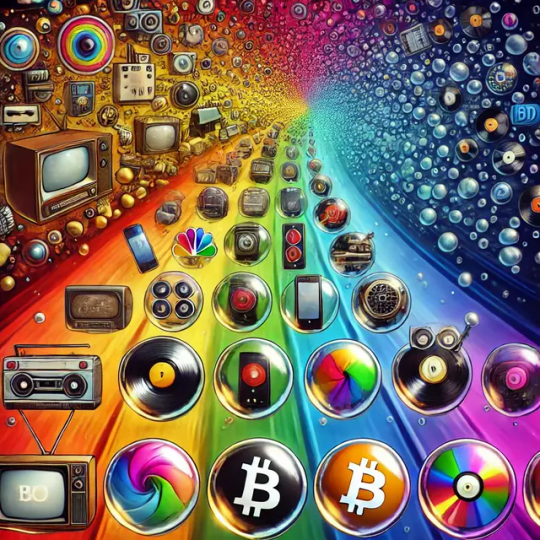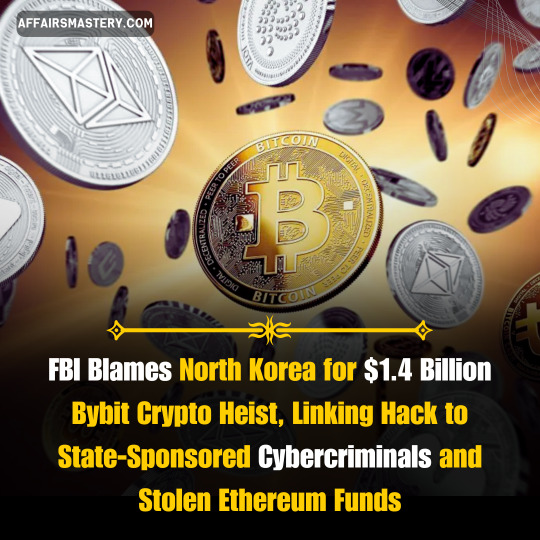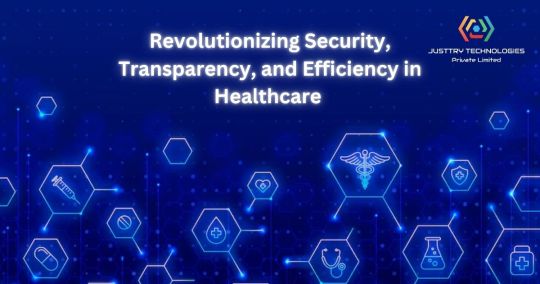#blockchain-technology
Explore tagged Tumblr posts
Photo

ETHGlobal Lisbon A recap of our first in-person event in Europe this year and our very first appearance in Portugal!Continue reading on Medium » https://ethglobal.medium.com/ethglobal-lisbon-b8d48ca8f000
0 notes
Text
The Four Horsemen of the Digital Apocalypse
Blockchain. Artificial Intelligence. Internet of Things. Big Data.
Do these terms sound familiar? You have probably been hearing some or all of them non stop for years. "They are the future. You don't want to be left behind, do you?"
While these topics, particularly crypto and AI, have been the subject of tech hype bubbles and inescapable on social media, there is actually something deeper and weirder going on if you scratch below the surface.
I am getting ready to apply for my PhD in financial technology, and in the academic business studies literature (Which is barely a science, but sometimes in academia you need to wade into the trash can.) any discussion of digital transformation or the process by which companies adopt IT seem to have a very specific idea about the future of technology, and it's always the same list, that list being, blockchain, AI, IoT, and Big Data. Sometimes the list changes with additions and substitutions, like the metaverse, advanced robotics, or gene editing, but there is this pervasive idea that the future of technology is fixed, and the list includes tech that goes from questionable to outright fraudulent, so where is this pervasive idea in the academic literature that has been bleeding into the wider culture coming from? What the hell is going on?
The answer is, it all comes from one guy. That guy is Klaus Schwab, the head of the World Economic Forum. Now there are a lot of conspiracies about the WEF and I don't really care about them, but the basic facts are it is a think tank that lobbies for sustainable capitalist agendas, and they famously hold a meeting every year where billionaires get together and talk about how bad they feel that they are destroying the planet and promise to do better. I am not here to pass judgement on the WEF. I don't buy into any of the conspiracies, there are plenty of real reasons to criticize them, and I am not going into that.
Basically, Schwab wrote a book titled the Fourth Industrial Revolution. In his model, the first three so-called industrial revolutions are:
1. The industrial revolution we all know about. Factories and mass production basically didn't exist before this. Using steam and water power allowed the transition from hand production to mass production, and accelerated the shift towards capitalism.
2. Electrification, allowing for light and machines for more efficient production lines. Phones for instant long distance communication. It allowed for much faster transfer of information and speed of production in factories.
3. Computing. The Space Age. Computing was introduced for industrial applications in the 50s, meaning previously problems that needed a specific machine engineered to solve them could now be solved in software by writing code, and certain problems would have been too big to solve without computing. Legend has it, Turing convinced the UK government to fund the building of the first computer by promising it could run chemical simulations to improve plastic production. Later, the introduction of home computing and the internet drastically affecting people's lives and their ability to access information.
That's fine, I will give him that. To me, they all represent changes in the means of production and the flow of information, but the Fourth Industrial revolution, Schwab argues, is how the technology of the 21st century is going to revolutionize business and capitalism, the way the first three did before. The technology in question being AI, Blockchain, IoT, and Big Data analytics. Buzzword, Buzzword, Buzzword.
The kicker though? Schwab based the Fourth Industrial revolution on a series of meetings he had, and did not construct it with any academic rigor or evidence. The meetings were with "numerous conversations I have had with business, government and civil society leaders, as well as technology pioneers and young people." (P.10 of the book) Despite apparently having two phds so presumably being capable of research, it seems like he just had a bunch of meetings where the techbros of the mid 2010s fed him a bunch of buzzwords, and got overly excited and wrote a book about it. And now, a generation of academics and researchers have uncritically taken that book as read, filled the business studies academic literature with the idea that these technologies are inevitably the future, and now that is permeating into the wider business ecosystem.
There are plenty of criticisms out there about the fourth industrial revolution as an idea, but I will just give the simplest one that I thought immediately as soon as I heard about the idea. How are any of the technologies listed in the fourth industrial revolution categorically different from computing? Are they actually changing the means of production and flow of information to a comparable degree to the previous revolutions, to such an extent as to be considered a new revolution entirely? The previous so called industrial revolutions were all huge paradigm shifts, and I do not see how a few new weird, questionable, and unreliable applications of computing count as a new paradigm shift.
What benefits will these new technologies actually bring? Who will they benefit? Do the researchers know? Does Schwab know? Does anyone know? I certainly don't, and despite reading a bunch of papers that are treating it as the inevitable future, I have not seen them offering any explanation.
There are plenty of other criticisms, and I found a nice summary from ICT Works here, it is a revolutionary view of history, an elite view of history, is based in great man theory, and most importantly, the fourth industrial revolution is a self fulfilling prophecy. One rich asshole wrote a book about some tech he got excited about, and now a generation are trying to build the world around it. The future is not fixed, we do not need to accept these technologies, and I have to believe a better technological world is possible instead of this capitalist infinite growth tech economy as big tech reckons with its midlife crisis, and how to make the internet sustainable as Apple, Google, Microsoft, Amazon, and Facebook, the most monopolistic and despotic tech companies in the world, are running out of new innovations and new markets to monopolize. The reason the big five are jumping on the fourth industrial revolution buzzwords as hard as they are is because they have run out of real, tangible innovations, and therefore run out of potential to grow.
#ai#artificial intelligence#blockchain#cryptocurrency#fourth industrial revolution#tech#technology#enshittification#anti ai#ai bullshit#world economic forum
32 notes
·
View notes
Text

HOW TO RECOVER YOUR MONEY FROM SCAMMERS - CAPTAIN WEBGENESIS.
Fraudsters steal hundreds of millions of pounds from innocent victims every minute using various methods such as phishing links and bogus investment schemes. That is why Captain WebGenesis, a Cyber organized foundation, is equipped with sophisticated recovery tools that are essential to assist fraud victims in recovering their monies. Although these fraudsters are generally intelligent, Captain WebGenesis is similarly designed with Cyber Intelligence (CYBINT) Experts who are very much knowledgeable in the crypto space and are able to penetrate to get to these fraudsters' systems thus obtaining access to the stolen funds and having them returned to your wallet in a timely manner. Captain WebGenesis is Extremely professional, Knowledgeable and always available for questions or consultations.
131 notes
·
View notes
Text
Empower Your Digital Presence with Cutting-Edge Frameworks
In today’s fast-evolving digital landscape, staying ahead requires more than just a functional website or application—it demands innovation and efficiency. At Atcuality, we specialize in Website and Application Framework Upgrade solutions tailored to your business goals. Whether you're looking to optimize performance, enhance user experience, or integrate the latest technologies, our team ensures seamless upgrades that align with industry standards. Transitioning to advanced frameworks not only improves loading speeds and scalability but also strengthens your cybersecurity measures. With Atcuality, you gain access to bespoke services that future-proof your digital assets. Let us elevate your online platforms to a new realm of excellence.
#ai applications#artificial intelligence#ai services#website development#website developer near me#website developers#website developer in india#web development#web design#application development#app development#app developers#digital marketing#seo services#seo#emailmarketing#search engine marketing#search engine optimization#digital consulting#virtual reality#vr games#vr development#augmented reality#augmented and virtual reality market#cash collection application#task management#blockchain#metaverse#cloud computing#information technology
7 notes
·
View notes
Text
Bitcoin's Bull Run: Is the $100,000 Milestone Imminent?

#Bitcoin#Cryptocurrency#Bitcoin Price#Crypto News#Blockchain#Investing#Finance#Technology#Future Of Money#Trump is the GOAT#Supergirl#Batman#DC Official#Home of DCU#Kara Zor-El#Superman#Lois Lane#Clark Kent#Jimmy Olsen#My Adventures With Superman#Daily Planet
7 notes
·
View notes
Text
Life in a Bubble: How Technological Revolutions Shape Society

Once upon a time, owning a television was an extraordinary luxury. Families gathered around small, grainy screens, captivated by black-and-white broadcasts that seemed magical at the time. Fast-forward to today, and we laugh at the thought of having just one screen—let alone one without color, HD, or streaming capabilities. Ever notice how every significant technological breakthrough feels monumental, only to become obsolete as soon as the next innovation arrives?
Understanding the Technological Bubble
Technological bubbles occur when groundbreaking innovations redefine societal norms, behaviors, and expectations. Each advancement creates its own bubble of influence—initially expanding as adoption grows, then ultimately bursting when a newer technology emerges.
Consider the evolution of televisions:
First Bubble: Black-and-white TVs revolutionized entertainment, bringing the world into living rooms for the first time.
Second Bubble: Color TVs popped the original bubble, making monochrome obsolete and setting a new standard.
Third Bubble: Flat-screen and HD televisions burst the color-TV bubble, making bulky sets feel like relics of the past.
Each bubble transformed society, influencing consumer behaviors, shifting economic landscapes, and altering our perception of normalcy.
Historical Echoes
Technological bubbles aren’t exclusive to televisions. They repeat throughout history, reshaping reality each time:
Communication: Letters → telephones → smartphones.
Music: Vinyl → cassettes → CDs → MP3 → streaming.
Internet: Dial-up → broadband → Wi-Fi → mobile connectivity.
Every bubble expanded rapidly, enveloping society in its new standards before bursting and being replaced by something even more revolutionary.
The Mother of All Bubbles
Today, we're living inside perhaps the largest technological bubble humanity has ever known: the global fiat monetary system and traditional finance. Like previous bubbles, this system feels unshakeable, inevitable, and everlasting. But like every bubble before it, it's ripe for disruption—this time, by decentralized technologies like Bitcoin.
Bitcoin isn't just a new type of money; it’s a radical departure from centralized financial control:
Decentralization vs. Centralization: Bitcoin puts financial power back into the hands of individuals.
Transparency vs. Secrecy: Blockchain technology makes financial transactions visible, verifiable, and resistant to manipulation.
Scarcity vs. Inflation: Unlike fiat currencies, Bitcoin has a capped supply, protecting against endless monetary inflation.
This next bubble is growing, quietly expanding in the shadows of mainstream finance, and it has the potential to burst the financial bubble we've lived in for generations.
What Happens When the Biggest Bubble Pops?
Imagine a world where financial control no longer rests in the hands of governments and banks, but with the people. When the fiat bubble bursts:
Financial Sovereignty: Individuals gain unprecedented financial autonomy and responsibility.
Power Redistribution: Central banks and financial institutions must adapt or risk obsolescence.
Societal Shifts: Our collective understanding of money, value, and community could be entirely redefined.
This transition won’t be without challenges. Initial instability and fierce resistance from established systems are inevitable. Yet, the opportunity for increased transparency, fairness, and efficiency makes this burst not just likely but necessary.
Preparing for the Pop
Every technological bubble eventually bursts. The question isn't if, but when. Understanding and recognizing this process enables us to position ourselves advantageously for the inevitable shift. Embracing the next technological wave means stepping beyond comfort zones and preparing to thrive in an evolved landscape.
Tick Tock Next Block.
Take Action Towards Financial Independence
If this article has sparked your interest in the transformative potential of Bitcoin, there’s so much more to explore! Dive deeper into the world of financial independence and revolutionize your understanding of money by following my blog and subscribing to my YouTube channel.
🌐 Blog: Unplugged Financial Blog Stay updated with insightful articles, detailed analyses, and practical advice on navigating the evolving financial landscape. Learn about the history of money, the flaws in our current financial systems, and how Bitcoin can offer a path to a more secure and independent financial future.
📺 YouTube Channel: Unplugged Financial Subscribe to our YouTube channel for engaging video content that breaks down complex financial topics into easy-to-understand segments. From in-depth discussions on monetary policies to the latest trends in cryptocurrency, our videos will equip you with the knowledge you need to make informed financial decisions.
👍 Like, subscribe, and hit the notification bell to stay updated with our latest content. Whether you’re a seasoned investor, a curious newcomer, or someone concerned about the future of your financial health, our community is here to support you on your journey to financial independence.
📚 Get the Book: The Day The Earth Stood Still 2.0 For those who want to take an even deeper dive, my book offers a transformative look at the financial revolution we’re living through. The Day The Earth Stood Still 2.0 explores the philosophy, history, and future of money, all while challenging the status quo and inspiring action toward true financial independence.
Support the Cause
If you enjoyed what you read and believe in the mission of spreading awareness about Bitcoin, I would greatly appreciate your support. Every little bit helps keep the content going and allows me to continue educating others about the future of finance.
Donate Bitcoin:
bc1qpn98s4gtlvy686jne0sr8ccvfaxz646kk2tl8lu38zz4dvyyvflqgddylk
#Bitcoin#Technological Revolution#Future of Finance#Financial Sovereignty#Decentralization#Tech Evolution#The Next Bubble#History of Technology#Society Shift#Disruptive Innovation#Blockchain#TickTockNextBlock#Digital Economy#Philosophy of Money#Economic Shift#financial empowerment#financial education#globaleconomy#finance#digitalcurrency#financial experts#cryptocurrency#unplugged financial
3 notes
·
View notes
Text
🚨 What Is a 51% Attack? And Should You Worry?
Blockchain is secure… but it’s not invincible. A 51% Attack happens when one group controls more than 50% of a blockchain’s mining power, allowing them to:
❌ Rewrite transactions (double-spending coins!) ❌ Block other users from making transactions ❌ Undermine trust in the network
🚀 Why does this matter? ✅ Bitcoin is too big to be attacked – but smaller blockchains are at risk! ✅ This is why decentralization is key – no single group should have too much power.
📩 Do you think crypto networks will always be secure? Let’s chat! 🔁 Reblog to spread awareness!
#crypto#cryptocurrency#bitcoin#blockchain#crypto for beginners#crypto security#crypto education#decentralization#investing#Crypto Made Simple#ethereum#crypto awareness#financial freedom#crypto investing#technology#future of money#finance#crypto trading#DeFi#Web3
4 notes
·
View notes
Text

Metrotopia Metaverse
#metaverse#architecture#future#innovation#amazing#zaha hadid architects#architect#architectural#designer#design#blockchain technology#web3#nft news
62 notes
·
View notes
Text

The FBI has accused North Korea of orchestrating a massive $1.4 billion hack on crypto exchange Bybit, making it one of the largest crypto thefts in history. The attack, linked to the state-sponsored TraderTraitor group, resulted in the theft of Ethereum funds.
With North Korea’s cybercriminals increasingly targeting financial platforms, the FBI warns exchanges to bolster security against such sophisticated threats.
#general knowledge#affairsmastery#generalknowledge#current events#current news#upscaspirants#upsc#generalknowledgeindia#world news#breaking news#news#government#general news#technology#fbi#fbi international#trump#north korea#bybit#bybit hack#coinbase#bitcoin#crypto market#ethereum#crypto#blockchain#cryptocurrency#cryptoinvesting#digitalcurrency#cybercrime
2 notes
·
View notes
Text

#crypto#japan#social networks#solana#hades game#money#technology#blockchain#bitcoin#ethereum#artists on tumblr#art#positive thoughts#thoughts
2 notes
·
View notes
Text

Acadecraft Partners with Wadhwani Foundation's Government Digital Transformation Initiative to Develop eLearning Courses
#digitaltransformation#technology#innovation#business#digitalmarketing#ai#digital#artificialintelligence#software#machinelearning#automation#businessgrowth#tech#iot#techinnovation#bigdata#cybersecurity#cloud#data#cloudcomputing#smallbusiness#customerexperience#marketing#sap#webdevelopment#erp#blockchain#analytics#ecommerce#datascience
2 notes
·
View notes
Text
Is Bitcoin a Good Investment?
#cryptocurrency#Blockchain Technology#Decentralized Finance (DeFi)#Financial markets#Digital Assets#Investment Risks#Bitcoin Volatility#Inflation Hedge#Cryptocurrency Regulation#Bitcoin Investment
3 notes
·
View notes
Text
So this ad I just got.

So you admit it? You admit that cryptocurrency... is not real money? And your target audience doesn't see it that way, either?
Fascinating! Neat (:
#i actually think cryptocurrencies and blockchains had potential as a technology#but who cares when the execution was. yknow. All Of That Crap#(generative ai is the exact same thing to me. could have been so cool. alas!)
2 notes
·
View notes
Text
The 6 Roles of Blockchain Technology in Pharma’s Future

Introduction
The pharmaceutical industry is undergoing a digital transformation, and blockchain technology is at the forefront of this revolution. Traditional challenges such as counterfeit drugs, regulatory inefficiencies, clinical trial fraud, and data breaches have long plagued the sector. Blockchain, with its decentralized and tamper-proof nature, offers solutions that can enhance security, transparency, and operational efficiency.
As blockchain development service providers continue refining solutions for pharma, companies are beginning to adopt this technology to streamline supply chains, enhance patient data security, and automate compliance. This article explores six critical roles that blockchain will play in shaping the future of the pharmaceutical industry.
1. Securing the Pharmaceutical Supply Chain
Eliminating Counterfeit Drugs
Counterfeit medications pose a significant threat to global health, contributing to thousands of deaths annually. The World Health Organization (WHO) estimates that one in ten medical products in low- and middle-income countries is substandard or falsified.
End-to-End Traceability
Blockchain technology enables a fully transparent supply chain, where each transaction is recorded in an immutable ledger. This ensures that every stakeholder—from manufacturers to pharmacists—can verify a drug’s authenticity in real-time.
Real-Time Verification
With blockchain-based tracking, patients, healthcare providers, and regulatory agencies can instantly verify the legitimacy of medications. Leading pharmaceutical companies like Pfizer and Roche are already exploring blockchain to secure drug distribution and eliminate counterfeit products from the market.
2. Enhancing Drug Safety and Regulatory Compliance
Immutable Drug Records
Regulatory compliance in the pharmaceutical industry requires strict adherence to safety protocols, but traditional record-keeping methods are prone to errors and fraud. Blockchain ensures that all drug-related data, including batch numbers, manufacturing dates, and storage conditions, are permanently recorded and cannot be altered.
Automated Compliance Monitoring
Smart contracts—self-executing digital agreements stored on the blockchain—can automate compliance checks, ensuring that drugs meet safety regulations before they reach the market. This reduces human error and enhances accountability.
Rapid Recalls and Alerts
When safety concerns arise, blockchain enables instant notifications and targeted recalls. Instead of relying on slow, paper-based tracking systems, companies can pinpoint affected batches within seconds, reducing risks to patients and minimizing financial losses.
3. Revolutionizing Clinical Trials and Research
Data Integrity and Security
Clinical trials are the foundation of medical innovation, but they are often plagued by fraud and inefficiencies. Blockchain ensures that trial data is immutable, preventing manipulation or selective reporting. This guarantees transparency and fosters trust in research findings.
Streamlined Patient Consent
Informed consent is a crucial aspect of clinical trials, yet traditional methods often lack security and efficiency. Blockchain-based smart contracts can automate consent management, ensuring that patients have full control over their participation while reducing administrative burdens for researchers.
Faster Drug Development
By securely sharing trial data among researchers, pharmaceutical companies, and regulatory agencies, blockchain accelerates the drug development process. Faster access to verified data can lead to quicker approvals, ultimately bringing life-saving medications to patients sooner.
4. Enabling Secure and Efficient
Automated Payments with Smart Contracts
The pharmaceutical industry involves complex financial transactions between manufacturers, insurers, healthcare providers, and distributors. Blockchain simplifies these transactions by using smart contracts to automate payments based on pre-set conditions.
Reduced Fraud and Corruption
Traditional financial systems in the pharma sector are susceptible to fraud and inefficiencies. Blockchain’s decentralized ledger eliminates intermediaries, ensuring transparent and corruption-free transactions.
DeFi in Pharma
Decentralized finance (DeFi) applications powered by blockchain could revolutionize pharmaceutical funding. Companies can leverage tokenized assets to raise funds for research and development, bypassing traditional banking limitations.
5. Improving Patient Data Security
Decentralized Electronic Health Records (EHR)
Patient data is often stored in centralized databases, making it vulnerable to cyberattacks. Blockchain provides a decentralized and encrypted framework where patients control their health records, granting access only to authorized healthcare providers.
Seamless Data Sharing
Healthcare providers often struggle with interoperability issues, leading to treatment delays. Blockchain allows for secure, real-time data sharing across hospitals, research institutions, and insurance providers, ensuring a more efficient healthcare ecosystem.
Enhanced Privacy Protections
With data breaches on the rise, blockchain’s encryption protocols enhance patient privacy, reducing the risk of identity theft and unauthorized access to sensitive medical information.
6. The Future of Blockchain in Pharma
AI and Blockchain Integration
The combination of artificial intelligence (AI) and blockchain could further optimize drug manufacturing, predicting supply and demand trends to reduce waste and inefficiencies.
Tokenized Incentives
Blockchain could introduce tokenized rewards for patients participating in clinical trials, encouraging greater involvement and leading to more diverse research data.
Decentralized Research Collaboration
Pharmaceutical companies, universities, and biotech startups could collaborate more efficiently using blockchain-based decentralized networks. This would eliminate data silos and accelerate groundbreaking medical discoveries.
Conclusion
Blockchain technology is revolutionizing the pharmaceutical industry, offering unprecedented levels of security, efficiency, and transparency. From securing supply chains and automating compliance to enhancing patient data security and accelerating drug development, blockchain is set to become an essential pillar of the pharma ecosystem. As blockchain development service providers continue to innovate, pharmaceutical companies that embrace this technology will be better positioned to lead in an increasingly digital and decentralized future. The adoption of blockchain is not just a technological upgrade—it is a necessary evolution for a safer, more efficient, and patient-centric pharmaceutical industry.
#blockchain#blockchain development services#blockchain development#blockchain in healthcare#supply chain management#supply chain#technologies#development
2 notes
·
View notes







